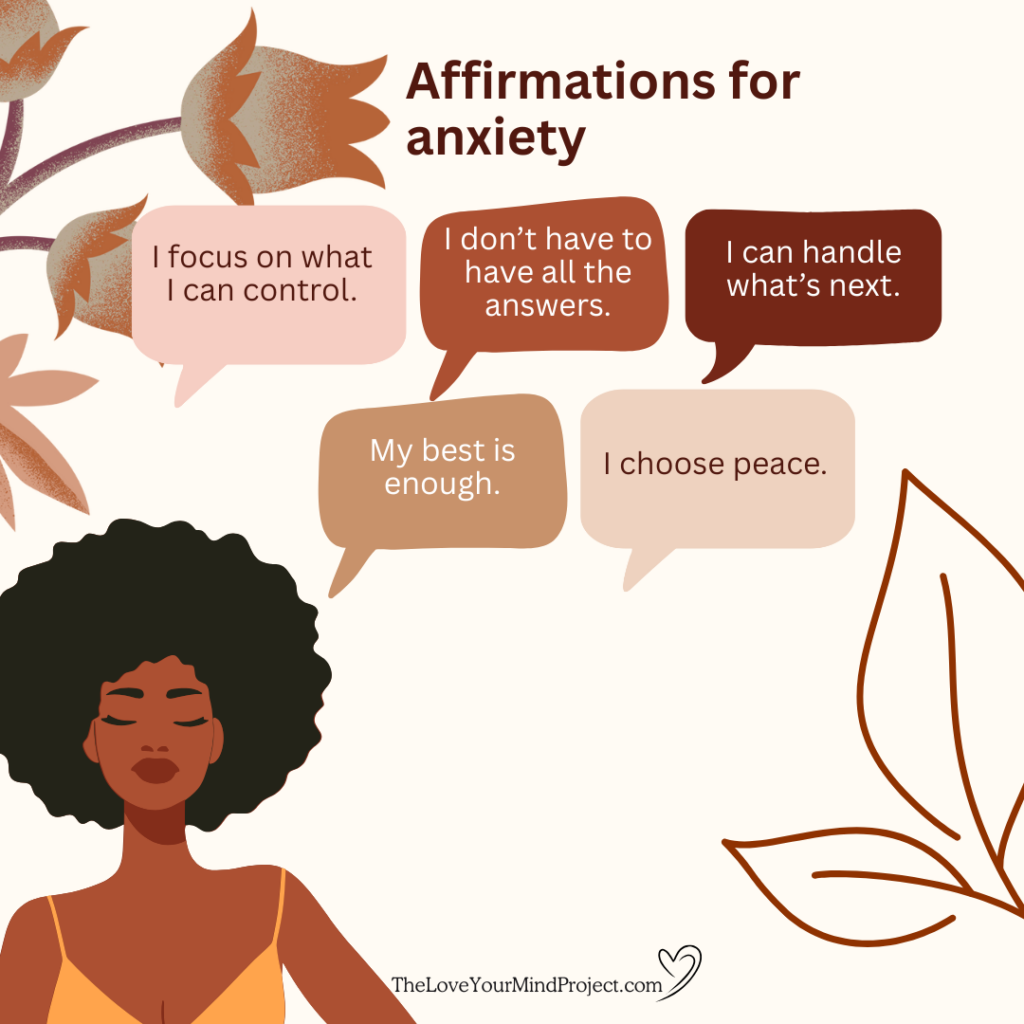- How emotions show up in the body (and why it matters) - February 6, 2026
- How to heal from emotional abuse: A Black woman’s guide to gentle rebuilding - January 29, 2026
- How to process emotions: What it really means and why it’s essential for Black women - January 22, 2026
Do you struggle with nervousness, worry, or fear? These affirmations for anxiety can help quiet your mind and reset your focus.

Life can feel like a breeding ground for anxiety. From constant change to disturbing news headlines, it’s not uncommon to be overwhelmed before your first coffee.
If you deal with disruptive anxiety symptoms regularly, you don’t have to push through them. You deserve relief, and positive affirmations can help.
What's in this article?
Why anxiety can feel so overwhelming
Anxiety is your mind trying to keep you safe. When it senses danger, it activates the fight-or-flight response—heart pounding and muscles tightening—as your body goes into survival mode.
But the mind doesn’t always know the difference between a dangerous threat and a stressful moment. This is why you can feel similar anxiety symptoms from a near-death experience and from seeing a spider on the wall 1.
Chronic anxiety is when the mind often signals danger when there is none, and this can take a toll. You may find it hard to sleep or focus. Or maybe you feel it physically, with headaches, nausea, or muscle pain 2.
As Black women, we handle so much—balancing work, motherhood, caregiving and more, with the additional pressure to keep it together. Living in survival mode, exhausted, hyper-alert, and easily triggered by the smallest things does not have to be our story.
>> MORE: How to get help with your mental health
How affirmations can help with anxiety
Anxiety can be like a fire. Certain thoughts and reactions add fuel. Affirmations can help you pause and let the fire subside.
Let’s say you read a work email announcing layoffs, and your mind instantly spirals with worrisome thoughts.
“I know they’re going to let me go. What if I can’t find another job? How am I going to make ends meet?”
Positive affirmations can interrupt those thought patterns that fuel anxiety and panic.
“This is scary, but right now, I’m good. I can handle whatever I need to.”
Science backs up the power of positive affirmations. Research shows that affirmations can reshape neural pathways, changing how we respond to stress and helping us stay grounded in truth instead of fear 3.
13 affirmations for anxiety—to quiet unnerving thoughts
Choose one or two of these affirmations for anxiety to help anchor your focus on what’s true, not what may or may not happen.
#1 I notice this anxious feeling, and it’s okay
We’re often taught to suppress our feelings or pray them away. But how we feel is not inherently right or wrong. It’s a signal—part of a physiological response 4. You don’t have to judge yourself for your emotions. Tell yourself, “I see you,” and identify what you need, emotionally.
#2 This feeling and its intensity won’t last forever
Uncomfortable emotions seem to last forever, but they don’t. Feelings come and go if we let them 5. If something makes you super happy now, you may not feel the same way in an hour. And when someone ticks you off, that, too, can pass. So acknowledge how you feel, but know it’s temporary.
>> MORE: Signs the burden of depression is too heavy
#3 I’ll let the thought just be a thought
Not every idea that passes through your mind is true 6. Neither is it always a warning, a sign, or something that needs additional context or meaning. Sometimes, a thought just needs to be a thought, especially if you tend to expect the worst-case scenario. When an anxious thought pops up, acknowledge it and let it pass.
#4 I can handle whatever comes next
Don’t listen to that inner critic or any voice that tells you you’re incapable. You’re strong—much stronger than you think. You’ve made it this far. Trust yourself to make it through what’s next. Tell yourself you’ve got this.
#5 I focus on what I can control
You can’t control it all. If you’re constantly trying to prepare for what could go wrong, you’ll wear yourself out. Let go of what’s beyond your reach. Taking responsibility for everything is too heavy a burden for Black women to bear. It’s time we set ourselves free.

#6 Right now, I am safe
Certain situations may spark fear or nervousness, like flying on an airplane or being in a large crowd. Use these moments to tell yourself that you’re safe. Repeating this affirmation can signal to your body that there’s no imminent threat, and you can relax.
#7 I can handle even what I don’t want to
The mind may not know it, but just because something is uncomfortable doesn’t mean it’s dangerous. If anxiety sets in because you’re in a situation you don’t want to be in, tell yourself you can still handle it. If you’re in it, trust that you’re equipped for it.
#8 I accept myself, even my imperfections
Perfectionism can come with a load of anxiety. You can’t make mistakes or show weakness. You may have a killer work ethic, but it’s not sustainable. When you feel like there’s no room for error, remind yourself that you’re enough right now as you are. You’re worthy of love, rest, support, and more—flaws and all.
#9 I don’t have to have all the answers
You may be the friend everyone comes to for advice or encouragement. But sometimes, we’re forced to sit with the fact that we don’t have the answers. Release the pressure to know it all.
#10 My best is enough
No matter what your best looks like, it’s enough. Maybe on Monday, you can cook all of your meals, exercise for an hour, and keep the house spotless. But Tuesday? It’s Hot Pockets and catching up on your favorite Netflix series. When life feels like too much, whatever you can give is enough.
#11 I’m not responsible for others’ happiness
People in your circle may feel some type of way about your decisions. As harsh as it sounds, it’s not your problem. While we never intend to hurt anyone, you can’t control how others feel. Living your life based on others’ happiness will leave you miserable, constantly worried and second-guessing yourself. Let go of the emotional weight and the anxiety that comes with it.
>> MORE: Signs of a toxic relationship—and what to do about it
#12 One moment at a time
Major life changes can bring an uncertainty that feels unbearable. But you can handle even a significant overhaul by taking it one step at a time. When the big picture seems overwhelming, bring your focus back to right now.
#13 I choose peace
You can’t control what thoughts pop into your head, but you can control where your mind stays. Choosing peace means that no matter what’s happening in your mind, you can create space to quiet it and focus on what’s true—that you’re enough and you’ve got this.
How to use positive affirmations for anxiety
Affirmations can be a powerful tool to combat anxiety, especially when used with other proven strategies. Here are a few ways to incorporate them into your life.
- Use them in the moment: When anxiety strikes, take a pause and repeat one or two affirmations that shift your focus.
- Set a routine: Set aside a few minutes each day to prioritize one or two phrases that resonate with you.
- Engage your senses: Try writing them down, drawing them out, speaking or singing them aloud if racing thoughts make it hard to focus.
- Pair with mindfulness: Add an affirmation while you stretch, take deep breaths, or practice other mindfulness exercises that help you stay present.
- Pair them with therapy: A licensed therapist can build on your affirmations and help you understand triggers, unhealthy thought patterns, and the best ways to stay ahead of anxiety symptoms.
Affirmations for anxiety FAQs
Do affirmations work for anxiety?
Yes, affirmations can help reduce anxiety symptoms by shifting your mind away from spiraling thoughts to positive, self-affirming messages.
How do affirmations work?
An affirmation is positive self-talk that can counter anxious thoughts. Repeating them can help change the brain’s response to stress, especially when combined with other strategies, like therapy and mindfulness.
How often should you use affirmations?
Use affirmations as often as needed. Whether it’s once a day or every time your mind starts to spiral, affirmations are tools you can return to whenever you need a reset.
References
1 Understanding the stress response – Harvard Health. (2011, June 15). Harvard Health. https://www.health.harvard.edu/staying-healthy/understanding-the-stress-response
2 Clinic, C. (2023, March). You Guessed It: Long-Term Stress Can Make You Gain Weight. Cleveland Clinic. https://health.clevelandclinic.org/stress-and-weight-gain
3 Cascio, C. N., O’Donnell, M. B., Tinney, F. J., Lieberman, M. D., Taylor, S. E., Strecher, V. J., & Falk, E. B. (2015). Self-affirmation activates brain systems associated with self-related processing and reward and is reinforced by future orientation. Social Cognitive and Affective Neuroscience, 11(4), 621–629. https://doi.org/10.1093/scan/nsv136
4 Šimić, G., Tkalčić, M., Vukić, V., Mulc, D., Španić, E., Šagud, M., Olucha-Bordonau, F. E., Vukšić, M., & R. Hof, P. (2021). Understanding Emotions: Origins and Roles of the Amygdala. Biomolecules, 11(6), 823. https://doi.org/10.3390/biom11060823
5 Emotion Exposure: DBT Skills, Worksheets, Videos, Exercises. (2020, October 16). Dialectical Behavior Therapy. https://dialecticalbehaviortherapy.com/emotion-regulation/emotion-exposure/
6 Villines, Z. (2022, June 20). Cognitive restructuring and its techniques. Medicalnewstoday.com; Medical News Today. https://www.medicalnewstoday.com/articles/cognitive-restructuring
